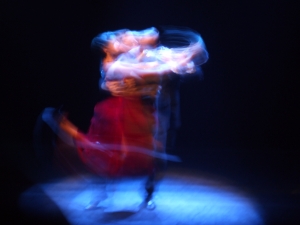Cope v. Utah Valley State College, a case from the Supreme Court of Utah, involved plaintiff who was a member of a dance team at a state-owned university. She was enrolled in college courses that provided academic credit for participation on the dance team.
 During a practice session, she was performing a routine where her dance partner lifted her on his shoulders and then she would do a backflip. During the learning phase of new routines, it is common for spotters to be present to prevent the performer from being injured.
During a practice session, she was performing a routine where her dance partner lifted her on his shoulders and then she would do a backflip. During the learning phase of new routines, it is common for spotters to be present to prevent the performer from being injured.
On this particular occasion, there were not spotters present, and plaintiff and her dance partner performed the move two times. Both times, the pair was unable perform the lift properly. Her dance partner told the course instructor that he was unable to perform this lift properly, and she instructed them to try a third time. She told partner to lift with more force and plaintiff to push off into the flip with more force as well. She told them if they didn’t get it right, it would be cut from the routine.
On the third try, plaintiff lost her balance and fell. Her partner attempted to use his body to prevent her from falling to the ground, but her head slammed into his knee and she was seriously injured. As our Boston personal injury attorneys understand, it is an instructor’s job to provide proper safety instruction and provide a reasonably safe environment.
Plaintiff filed a personal injury lawsuit against the university, alleging negligence was responsible for her being hurt. She also argued university was liable for instructor’s actions under the respondeat superior doctrine, which holds employers liable for employee’s negligent conduct.
Defendant filed a motion for summary judgment, asking the case be dismissed on grounds they owed no duty of care to plaintiff, because they did not have a special relationship with her. Trial court denied this motion.
Defendant then re-filed the motion with additional evidence that the pair had practiced the dance move on a previous occasion, and the trial court dismissed the case.
Plaintiff appealed, arguing the state special relationship doctrine did not apply and that this was an ordinary negligence action. On appeal, the court agreed with plaintiff that case did not involve the special duty doctrine and remanded the case so a trial could be held.
Essentially, this case dealt with what is known as the doctrine of sovereign immunity, as the law is in called in the Commonwealth of Massachusetts. Governmental agencies, including some public universities, are provided certain shields from liability based upon the fact they are performing a necessary public function.
However, despite the fact that institutional defendants normally assert this defense, it does not apply in many situations. There are numerous exceptions to the doctrine of sovereign immunity, such was when the defendant is acting in its proprietary function rather than its sovereign capacity.
One of the best things potential plaintiffs can do is to make sure their personal injury attorney is familiar with the requirements of suing a governmental agency.
If you are injured in an accident in Massachusetts, call Jeffrey Glassman Injury Lawyers for a free and confidential appointment — (617) 777-7777.
More Blog Entries:
Bar Owners Face $6.7 Million Damage Settlement After Injury on Staircase, December 31, 2012
 Boston Personal Injury Attorney Blog
Boston Personal Injury Attorney Blog

